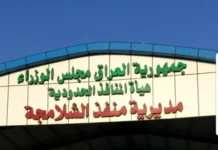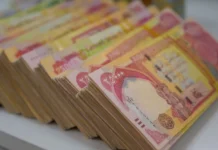CandyKisses: US delegation to visit Baghdad soon with messages from the White House
twilight News- Baghdad
He unveiled something. An Iraqi diplomatic source on Wednesday announced the upcoming visit of a US delegation to the capital Baghdad To deliver messages from the White House administration regarding Iraqi files.
He said The source told Shafaq News Agency, “A delegation of American political figures will soon visit Baghdad with messages from Washington to All partners in the political process in Iraq.”
“The upcoming U.S. visit is a confirmation of for Washington’s interest in what is happening in Iraq.” and witness U.S.-Iraq Relationship: Diplomatic Stalemate Since Donald Trump Took Office The position, as communication and meetings were limited to the Chargé d’Affaires of the U.S. Embassy in Baghdad, Stephen Fagen, and a single call received by Prime Minister Mohammed Shia al-Sudani, from a minister Foreign Affairs Marco Rubio.
Last August, however, a high-ranking U.S. delegation visited Baghdad, the Iraqi capital, to discuss a number of files with Iraqi officials.
According to An informed source who spoke to Shafaq News Agency at the time said that the delegation discussed the US withdrawal file from its main bases in Iraq and the repercussions of this, in addition to an economic and other file related to Powered.
Loyal On October 19, US President Donald Trump decided to appoint Mark Safaya as Special Envoy for Iraq.
He wrote Trump on his platform “Truth Social” and followed by Shafaq News Agency, saying that “Mark has a deep understanding of Iraq-U.S. relations, and his extensive connections in the The region, will contribute to advancing the interests of the American people.”
Wasfaya He is an American businessman of Iraqi (Chaldean/Assyrian) origin from the state of Michigan. He has emerged in recent years with his support for Trump’s election campaign and his moves among Middle Eastern Communities in the United States
************
Tishwash: The National Bank of Iraq announces the completion of its transition to the new global standard, SWIFT MX.
The National Bank of Iraq announced the completion of its transition to the new global standard SWIFT MX for financial messages, a step that marked a significant milestone in the bank’s technological infrastructure modernization and enhanced readiness for digital transformation.
The bank said in a statement, “The implementation of this transformation comes as part of the bank’s transition from the old MT standard to the MX ISO 20022 model, which is the most advanced, structured and data-rich framework in the global financial messaging sector.
The transformation process was carried out across all operational channels with high efficiency and minimal downtime, reflecting the bank’s strong technical readiness, accurate planning, and commitment to providing its services without any significant interruption.”
He pointed out that “this transformation is an advanced step within the strategic roadmap of the National Bank of Iraq to modernize its systems, enhance its compatibility with global best practices, and provide an advanced digital banking experience for its individual and corporate clients.”
The statement quoted Aqeel Ezzedine, Chief Operating Officer and Deputy CEO of the National Bank of Iraq, as saying that “the smooth transition to the MX standard is the result of a robust system of governance, teamwork and careful planning, and represents an important step in modernizing the payments infrastructure and enhancing the reliability and security of banking operations.”
Hani Khalil, head of the transformation department at the National Bank of Iraq, said, according to the statement, that “the completion of this transformation embodies the bank’s commitment to keeping pace with the latest international standards in payment systems, and building a more transparent, integrated and high-quality financial data structure, which enhances customer experience and strengthens the bank’s position within the regional financial system.”
The MX standard enables a more accurate and richer exchange of information in financial messages, with substantial improvements in transaction tracking and identification of parties, supporting global trends towards greater efficiency and transparency in payments.
Since the new system came into effect, the bank has not recorded any significant problems, which confirms the success of the implementation process and the close coordination between the transformation, IT and operations teams, in addition to effective cooperation with partners and regulatory authorities. link
************
Tishwash: The oil and gas law: Kurdish priorities in the Iraqi government formation negotiations.
Following the election results and the announcement of the number of seats won by the Kurdish blocs in the Iraqi parliament, attention is now focused on the Kurds’ objectives for the next phase and their future plans.
President Masoud Barzani called for the implementation and enactment of five key laws, most notably amending the election law, implementing Article 140 of the constitution, and enacting the long-stalled oil and gas law, which has been stalled for nearly two decades. He
also reiterated his call for Kurdish political forces and parties to proceed with forming the new Kurdistan Regional Government.
In his address, Barzani stated that after 2003 and the fall of Saddam Hussein’s regime, a golden opportunity presented itself, and the political process was built upon three principles: balance, consensus, and equality. He added that in 2005, the country’s permanent constitution was ratified.
Despite some shortcomings, it is considered one of the best constitutions in the region, promising a bright future. This constitution, he emphasized, must be respected as it will usher Iraq into a new era by regulating its relations with regional and international partners.
The passage of the oil and gas law is considered a solution to most of Kurdistan’s problems and a crucial step towards resolving outstanding financial issues and unifying oil policies between the federal government and the Kurdistan Region. Among these issues are the deep and persistent disagreements over energy resource management, which have prevented the law’s enactment.
These disagreements have led to the law’s failure to pass. The unresolved problems between Baghdad and Erbil include issues such as the oil and gas contracts signed by Kurdistan, which have resulted in legal disputes between the Iraqi Ministry of Oil and the regional government.
Meanwhile, former Patriotic Union of Kurdistan (PUK) MP Gharib Ahmed asserts that most of the outstanding problems between Baghdad and Erbil stem from the lack of an oil and gas law. Speaking to Al-Mada, he emphasized that “passing the law will contribute to resolving the most significant challenges, namely oil exports, the payment of employee salaries, and the economic problems that have plagued Kurdish citizens for years.”
He pointed out that “the disagreements between the federal government and the Kurdistan Regional Government have prevented the law’s passage and its submission by the federal cabinet for parliamentary approval.”
The Kurdistan Region experienced a severe financial crisis as a result of the federal Ministry of Finance’s withholding of employee salaries, accusing the regional government of failing to remit non-oil revenues and of not fully delivering oil to the State Oil Marketing Organization (SOMO). Months ago, the federal government and the Kurdistan Regional Government reached a historic agreement that allowed the region to resume oil exports through the Turkish port of Ceyhan.
Although the federal government began disbursing salaries to employees in the region, delays persist, with Baghdad and Erbil exchanging accusations regarding who is responsible. Meanwhile , Sabah Hassan, a member of the Kurdistan Parliament from the Kurdistan Democratic Party (KDP), indicated that passing the oil and gas law is the solution to the problems between Baghdad and Erbil.
In an interview with Al-Mada, Hassan stated, “The solution to the problems between Baghdad and Erbil, and the crisis that recurs monthly, is the passage of the oil and gas law in Parliament, which will guarantee everyone their rights.”
He added, “The salary problem has persisted for 10 years, and there is a deliberate effort by some political entities to create problems. The optimal solution to these recurring crises lies in passing the oil and gas law, as it will provide a comprehensive solution. All agreements between Baghdad and Erbil are temporary and are not adhered to by the federal government.”
He emphasized that “the oil and gas law is based on a constitutional provision and article, but some political blocs are shirking their responsibility to implement this article because it pertains to the Kurdistan Region, just as they have shirked their responsibility to implement Article 140 of the Iraqi Constitution.”
In Erbil, Deputy Prime Minister of the Kurdistan Region, Qubad Talabani, received a delegation from the US-Kurdistan Business Council, headed by its president, David Tvorey. The two sides discussed several issues of mutual interest.
The Deputy Prime Minister indicated that “we support the swift passage of the oil and gas law during the new session of the Iraqi Parliament, which will contribute to resolving the disputes between the region and Baghdad in accordance with the Constitution and the relevant powers, and in a manner that respects the special status of the Kurdistan Region.”
The oil and gas law is one of the most prominent outstanding issues, with disagreements resurfacing with each parliamentary session without reaching a final settlement that satisfies all parties.
Regarding he revitalization of the economy, economic expert Salar Aziz believes that the oil and gas law can only be passed by prioritizing it in the negotiations to form the Iraqi government.
In an interview with Al-Mada, he explained, “This issue must be a top priority in negotiations between the Kurdish, Shia, and Sunni parties to ensure its passage during this session. This requires unity among the Kurdish parties on this matter, speaking as a unified voice, so they can form a force to be reckoned with.”
He added, “Passing the law will contribute to improving the region’s economy, ending the salary crisis, operating refineries and gas plants, and utilizing the untapped oil reserves in the region’s fields. link





